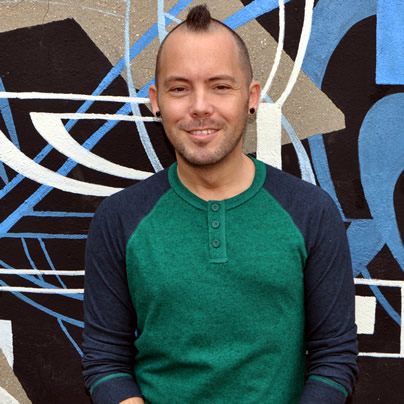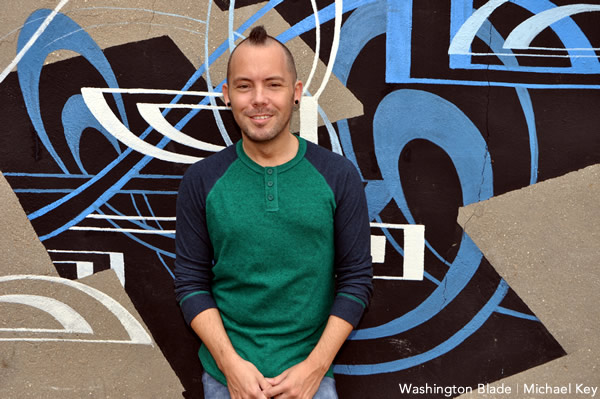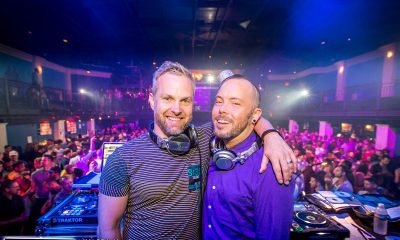Arts & Entertainment
Queery: Matt Bailer
The Mixtape DJ answers 20 gay questions

Matt Bailer was at Taint, a party at DC9, a few years ago and he saw Shea Van Horn dancing. Van Horn caught his eye, but not in “that” way.
“He just had this really magnetic way of dancing that made me want to know him,” Bailer says. “I could just tell he was having a lot of fun.”
Bailer, who’s been DJing professionally about five years, guest DJed for Taint at Van Horn’s invitation shortly thereafter. They talked over the summer and made plans to start their own party, having discovered how well their sets complemented each other. That September, they threw their first Mixtape, a party of rotating venues that features “anything you can dance to.” Last month, they had their four-year anniversary party at the Howard. A special “Halloween edition” is set for Wednesday, also at the Howard, starting at 10:30 p.m. ($10 cover). Visit mixtapedc.com for details. The event won Best Men’s Party in this year’s Best of Gay D.C. readers’ poll and typically draws between 800-1,000 music lovers.
Bailer, a Camp Springs, Md., native, DJs full time. He also spins at the weekly Friday Night Kickoff party at Nellie’s and at the ‘90s-themed Peach Pit at DC9 the third Saturday of the month.
After studying theater at Duke in North Carolina in the ‘90s, Bailer went to West Hollywood to pursue a recording career but was soon beset with a crystal meth addiction. After rehab and sobriety meetings that he still attends, Bailer says the key to “reprogramming my brain” was realizing how much better his life has become since those days.
“As time continued to pass, life started getting really good … and the more you kind of realize, ‘Oh well, that’s why I was living in my car before and had no money to my name because I was doing these drugs and now life is really good.’”
But isn’t it tempting spending so much time in gay nightlife circles? Bailer, who DJs full time, says he manages to stay clean because he views his nights out as having a job to do. He doesn’t go out often when he’s not working.
Bailer is single and enjoys music, movies, games and hanging out with friends in his free time. He lives at 14th and T, N.W.
How long have you been out and who was the hardest person to tell?
Since National Coming Out day my freshman year of college which was October, 1994. I’d always told myself that I wouldn’t tell my parents before they were ready to ask, and I wouldn’t lie when they did. It was an adjustment for them, but I was blessed with two amazing parents and a sister who love and support me unconditionally.
Who’s your LGBT hero?
Probably Sophie B. Hawkins. Her song “Damn I Wish I Was Your Lover” changed the way I listened to music and soon thereafter I started writing and recording my own original songs. Also, I don’t know if I’d call this person my LGBT hero per se, but there used to be a drag queen in Washington named Berlene who inspired the hell out of me in the late 1990s. She has since passed away, but she was the first truly ingenious drag performer I ever saw, pushing all the boundaries and working hard for every dollar she made. She also happened to be a very sweet person.
What’s Washington’s best nightspot, past or present?
Well it’s both the truth and shameless self-promotion, but I’ll be having the most fun wherever I’m DJing on any given night, which would be Nellie’s every Friday night, Mixtape on the second Saturday of the month, or Peach Pit at DC9 on the third Saturday of the month.
Describe your dream wedding.
Family, friends, laughter, music, dancing, unicorns, fireworks, Wilson Phillips performing “Hold On” — does there have to be a groom?
What non-LGBT issue are you most passionate about?
12-step programs work. Cancer sucks.
What historical outcome would you change?
The premature cancellations of “My So-Called Life” and “Pushing Daisies.”
What’s been the most memorable pop culture moment of your lifetime?
I remember exactly where I was — in line for the bathroom at VelvetNation — when I found out Madeline Kahn had died.
On what do you insist?
Honesty, kindness and a sense of humor.
What was your last Facebook post or Tweet?
I may sound like an old fuddy-duddy, but sometimes I wish they would collect everyone’s phones when they enter the club and give them back as they leave. Trust me, it’ll be way more fun if you stop texting and dance.
If your life were a book, what would the title be?
Uhhh, I dunno. “Matt Bailer & The Purple Crayon,” maybe? Purple is my signature color.
If science discovered a way to change sexual orientation, what would you do?
I would be grateful for having existed before such regressive rubbish was possible. I am so happy to be who I am. I wouldn’t want to change a thing.
What do you believe in beyond the physical world?
I try to live by the Golden Rule, because karma can be a blessing or a bitch. The Serenity Prayer is an incredibly helpful, often self-fulfilling 10 seconds. I believe there’s a power greater than myself out there, which helps me stay humble and grateful and sober. And I know my amazing mother is watching my fabulous life unfold on the big picture screen in heaven and she’s smiling down on me.
What’s your advice for LGBT movement leaders?
Keep on truckin.’ Slow but steady wins the race.
What would you walk across hot coals for?
Peanut butter cream pie. My mom used to make it often after we got the recipe from my outstanding piano teacher Mrs. Lloyd-Potts. Coffee is the most complicated thing I can cook, but even I learned how to make peanut butter cream pie ‘cuz it’s so freakin’ good.
What LGBT stereotype annoys you most?
“Glee” pretty much sums them all up.
What’s your favorite LGBT movie?
“Trick.” Runner-up: “Sordid Lives.”
What’s the most overrated social custom?
Oh don’t get me started. It actually relates back to my most recent Facebook post mentioned above, but it drives me INSANE how people seem utterly incapable of enjoying a club or a concert or even just a plain old conversation anymore without constantly disengaging to text or take pictures or video or whatever on cell phones.
What trophy or prize do you most covet?
I’ve already achieved more happiness than I ever dreamed of. I guess the cherry on top would be someone to share it with, but he hasn’t found me yet and I’m doing fine for now on my own.
What do you wish you’d known at 18?
Drugs are bad.
Why Washington?
I grew up in Prince George’s County near what is now the southern end of Metro’s Green Line. Washington is home for me. My sister and father both live less than an hour away. And as long as this city continues to grant me the privilege of making a career sharing music with people — something I’ve loved with all my heart since I was 5 years old — I can’t even begin to think about living anywhere else.
Out & About
Plan your wedding the LGBTQ way
Washington D.C. LGBTQ+ Wedding Expo scheduled for Sunday

Rainbow Wedding Network will host “Washington D.C. LGBTQ+ Wedding Expo” on Sunday, March 1 at 12:30 p.m.
Guests can meet and mingle with a curated selection of LGBTQ-welcoming wedding professionals from across the region, each ready to help bring your vision to life, and spend a beautiful afternoon exploring everything they need to create a celebration that reflects them.
There will be a relaxed, self-guided look at the Watergate’s spaces and amenities, savor signature cocktails and delicious tasting samples, and connect with other couples who are on the same journey.
Visit Eventbrite to reserve a spot.

Friday, February 27
Center Aging Monthly Luncheon With Yoga and Drag Bingo will be at 12 p.m. at the DC Center for the LGBT Community. Email Mac at [email protected] if you require ASL interpreter assistance, have any dietary restrictions, or questions about this event.
Go Gay DC will host “LGBTQ+ Community Happy Hour Meetup” at 7 p.m. at Freddie’s Beach Bar and Restaurant. This is a chance to relax, make new friends, and enjoy happy hour specials at this classic retro venue. Attendance is free and more details are available on Eventbrite.
Trans Discussion Group will be at 7 p.m. on Zoom. This group is intended to provide an emotionally and physically safe space for trans people and those who may be questioning their gender identity/expression to join together in community and learn from one another. For more details, email [email protected].
Saturday, February 28
Go Gay DC will host “LGBTQ+ Community Brunch” at 11 a.m. at Freddie’s Beach Bar & Restaurant. This fun weekly event brings the DMV area LGBTQ+ community, including allies, together for delicious food and conversation. Attendance is free and more details are available on Eventbrite.
The DC Center for the LGBT Community will host “Sunday Supper on Saturday” at 2 p.m. It’s more than just an event; it’s an opportunity to step away from the busyness of life and invest in something meaningful, and enjoy delicious food, genuine laughter, and conversations that spark connection and inspiration. For more details, visit the Center’s website.
Black Lesbian Support Group will be at 1 p.m. on Zoom. This is a peer-led support group devoted to the joys and challenges of being a Black lesbian. You do not need to be a member of the Beta Kappa Chapter or the Beta Phi Omega Sorority in order to join, but they do ask that you either identify as a lesbian or are questioning that aspect of your identity.Send an email to [email protected] to receive the zoom link.
Sunday, March 1
LGBTQ+ Community Coffee and Conversation will be at 12 p.m. at As You Are. This event is for people looking to make more friends and meaningful connections in the LGBTQ community. Attendance is free and more details are available on Eventbrite.
Monday, March 2
“Center Aging: Monday Coffee Klatch” will be at 10 a.m. on Zoom. This is a social hour for older LGBTQ+ adults. Guests are encouraged to bring a beverage of choice. For more information, contact Adam ([email protected]).
Tuesday, March 3
Universal Pride Meeting will be at 7 p.m. on Zoom. This group seeks to support, educate, empower, and create change for people with disabilities. For more details, email [email protected].
Wednesday, March 4
Job Club will be at 6 p.m. on Zoom upon request. This is a weekly job support program to help job entrants and seekers, including the long-term unemployed, improve self-confidence, motivation, resilience and productivity for effective job searches and networking — allowing participants to move away from being merely “applicants” toward being “candidates.” For more information, email [email protected] or visit www.thedccenter.org/careers.
Center Aging Women’s Social and Discussion Group will be at 6 p.m. on Zoom. This group is a place where older LGBTQ+ women can meet and socialize with one another. There will be discussion, activities, and a chance for guests to share what they want future events to include. For more information, email [email protected].
Thursday, March 5
The DC Center’s Fresh Produce Program will be held all day at the DC Center for the LGBT Community. People will be informed on Wednesday at 5 p.m. if they are picked to receive a produce box. No proof of residency or income is required. For more information, email [email protected] or call 202-682-2245.
Virtual Yoga Class will be at 7 p.m. on Zoom. This free weekly class is a combination of yoga, breathwork and meditation that allows LGBTQ+ community members to continue their healing journey with somatic and mindfulness practices. For more details, visit the DC Center’s website.
a&e features
Transmission DC breathes new life into a storied sound space
A fresh home for boundary-pushing culture on H Street

Late last year, phoenix-style, a fresh home for boundary-pushing culture arose on the H Street corridor. Transmission DC – a queer, trans, and POC-owned, operated, and centered community-focused venue – powered on in the former home to the Rock & Roll Hotel (famously, not a hotel, but very much rock & roll). Transmission (1353 H St., N.E.) arrives secure in its mandate – or even birthright – to provide a place to celebrate creativity and music through a lens of inclusivity and respect.
Transmission’s team brings experience, but also representation. Owners/partners Kabir Khanna (who is also programming director), Katii B, Ellie McDyre, and Kelli Kerrigan together previously managed 618 productions, a venue in Chinatown, crafting “some of D.C.’s freakiest parties, raves, and mosh pits” they note.
They packed up operations last fall to a space curated specifically for D.C.’s underground music and culture scene, building their efforts in Chinatown to bring in more fans in queer and POC circles.
Transmission, Khanna points out, is built on DIY values. In the music scene, DIY means that promoters and organizers – often disconnected from the mainstream and part of marginalized communities – build shows and programs collaboratively, but independently from institutions, supporting each other as smaller, independent venues close. Here, Transmission aims to ensure that those putting together these underground inclusive shows have a more permanent and stable home, can have access to resources, and can provide more sustainable income to artists. “We’re trying to get more people to support and enjoy the music, and also give artists and organizers within the DIY community more structure and a larger cut,” says Khanna.
Khanna also notes that Transmission operates “under the principles of safety, inclusivity, and respect.” McDyre added that even at venues that claim inclusivity, that statement might not take place in practice. We’re “not just pitting up a rainbow flag,” says McDyre, but as some of the owners are trans and POC, audiences can see themselves reflected at the top.
Much like the DIY nature of the music community, the Transmission owners brought a DIY ethos to turning around their space.
In March 2020 – the height of COVID lockdowns – Rock & Roll Hotel suddenly shuttered, though not due to the pandemic; instead, the venue claimed that decreasing sales and increasing competition led to the closure. For 14 years, it was the central spot for cheap beer and lesser-known and celebrated acts. The space stood vacant for more than five years, until Transmission turned the power back on.
“When we got into the space, it was effectively abandoned for years,” says Khanna. “There was a ton of mold, and paint primer covering all surfaces. It was nearly falling apart.” Khanna noted that many music venues like this one, regardless of how well it was maintained, “get the shit kicked out of it,” given the nature of shows. The team called in mold removal contractors, ripped up most of the floorboards, and started fresh.
Transmission’s first floor is styled as a stripped-down black box: the better to take in the music. “It’s minimal on purpose to act as a canvas for set design and music,” without a specific aesthetic, says Khanna. Moving upstairs, the second floor has been opened up, removing some walls, and now has a larger dance area than the first floor. Beyond the first two performance levels, and a holdover from Rock & Roll Hotel, is the rooftop. Though without a stage, the rooftop space is filled with murals splashed across the walls, with a full bar. Transmission’s current capacity is 496, but the team is looking to grow that number. Transmission will also leverage the full kitchen that Rock & Roll Hotel operated, bringing in Third Hand Kitchen to offer a variety of food, including vegan and vegetarian options.
Khanna pointed out an upcoming show reflective of Transmission’s inclusive ethos: Black Techo Matters on Feb. 27. The event is set to be “a dynamic, collaborative night of underground electronic music celebrating Black History Month.” Khanna says that techno came from Black music origins, and this event will celebrate this genesis with a host of artists, including DJ Stingray 313, Carlos Souffront, and Femanyst.





















